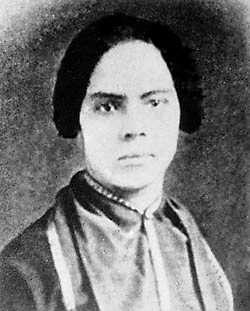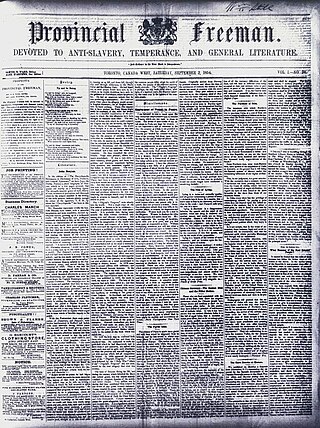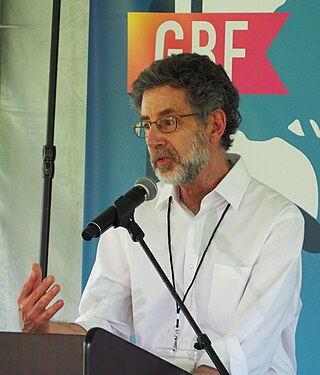Related Research Articles

Frederick Douglass was an American social reformer, abolitionist, orator, writer, and statesman. He became the most important leader of the movement for African-American civil rights in the 19th century.

Mary Ann Camberton Shadd Cary was an American-Canadian anti-slavery activist, journalist, publisher, teacher, and lawyer. She was the first black woman publisher in North America and the first woman publisher in Canada. She was also the second black woman to attend law school in the United States. Mary Shadd established the newspaper Provincial Freeman in 1853, which was published weekly in southern Ontario. it advocated equality, integration, and self-education for black people in Canada and the United States.
David Walker was an American abolitionist, writer, and anti-slavery activist. Though his father was enslaved, his mother was free; therefore, he was free as well. In 1829, while living in Boston, Massachusetts, with the assistance of the African Grand Lodge, he published An Appeal to the Colored Citizens of the World, a call for black unity and a fight against slavery.
African American literature is the body of literature produced in the United States by writers of African descent. It begins with the works of such late 18th-century writers as Phillis Wheatley. Before the high point of enslaved people narratives, African American literature was dominated by autobiographical spiritual narratives. The genre known as slave narratives in the 19th century were accounts by people who had generally escaped from slavery, about their journeys to freedom and ways they claimed their lives. The Harlem Renaissance of the 1920s was a great period of flowering in literature and the arts, influenced both by writers who came North in the Great Migration and those who were immigrants from Jamaica and other Caribbean islands. African American writers have been recognized by the highest awards, including the Nobel Prize given to Toni Morrison in 1993. Among the themes and issues explored in this literature are the role of African Americans within the larger American society, African American culture, racism, slavery, and social equality. African-American writing has tended to incorporate oral forms, such as spirituals, sermons, gospel music, blues, or rap.

Frederick Douglass Patterson was an American academic administrator, the president of what is now Tuskegee University (1935–1953), and founder of the United Negro College Fund. He was a 1987 recipient of the Presidential Medal of Freedom, the nation's highest civilian honor, and 1988 recipient of the Spingarn Medal from the NAACP.

Eaglebrook School is an independent junior boarding and day school for boys in grades six through nine. It is located in Deerfield, Massachusetts, on the Pocumtuck Range near Deerfield Academy and sited on an 724-acre (2.93 km2) campus which is also preserved by the Deerfield Wildlife Trust. Eaglebrook School is accredited by the Association of Independent Schools in New England (AISNE).

David William Blight is the Sterling Professor of History, of African American Studies, and of American Studies and Director of the Gilder Lehrman Center for the Study of Slavery, Resistance, and Abolition at Yale University. Previously, Blight was a professor of History at Amherst College, where he taught for 13 years. He has won several awards, including the Bancroft Prize and Frederick Douglass Prize for Race and Reunion: The Civil War in American Memory, and the Pulitzer Prize and Lincoln Prize for Frederick Douglass: Prophet of Freedom. In 2021, he was elected to the American Philosophical Society.

David Ruggles was an African-American abolitionist in New York who resisted slavery by his participation in a Committee of Vigilance and the Underground Railroad to help fugitive slaves reach free states. He was a printer in New York City during the 1830s, who also wrote numerous articles, and "was the prototype for black activist journalists of his time." He claimed to have led more than 600 fugitive slaves to freedom in the North, including Frederick Douglass, who became a friend and fellow activist. Ruggles opened the first African-American bookstore in 1834.

{{Infobox academic | name = John W. Blassingame | image = Blassingame.gif | alt = | caption = | birth_name = John Wesley Blassingame | birth_date = March 23, 1940 | birth_place = Covington, Georgia, US | death_date = February 13, 2000 (aged 59) | death_place = New Haven, Connecticut, US | home_town = | spouse = Teasie Jackson Blassingame | awards =
William L. Van Deburg was the Evjue-Bascom Professor of Afro-American Studies at the University of Wisconsin-Madison. He has written on antebellum slavery, on the history of black nationalism, and on contemporary African-American popular culture. Van Deburg retired from teaching in 2008 and is currently Professor Emeritus.

The Heroic Slave, a Heartwarming Narrative of the Adventures of Madison Washington, in Pursuit of Liberty is a short piece of fiction, or novella, written by abolitionist Frederick Douglass, at the time a fugitive slave based in Boston. When the Rochester Ladies' Anti Slavery Society asked Douglass for a short story to go in their collection, Autographs for Freedom, Douglass responded with The Heroic Slave. The novella, published in 1852 by John P. Jewett and Company, was Douglass's first and only published work of fiction.
Richard A. Yarborough is Professor of English and African-American literature and a Faculty Research Associate with the Ralph J. Bunche Center for African American Studies at the University of California, Los Angeles. He is also an editor of The Heath Anthology of American Literature.

Mark Hertsgaard is an American journalist and the co-founder and executive director of Covering Climate Now. He is the environment correspondent for The Nation, and the author of seven non-fiction books, including Earth Odyssey (1998) and Hot: Living Through the Next Fifty Years on Earth (2011).
Manisha Sinha is an Indian-born American historian, and the Draper Chair in American History at the University of Connecticut. She is the author of The Slave's Cause: A History of Abolition (2016), which won the Frederick Douglass Book Prize.
Robert Gooding-Williams is M. Moran Weston/Black Alumni Council Professor of African-American Studies and Professor of Philosophy at Columbia University. He is the founding director of Columbia's Center for Race, Philosophy, and Social Justice. He specializes in philosophy of race and Continental philosophy, especially Nietzsche.
Ariela Julie Gross is an American historian. Previously the John B. and Alice R. Sharp Professor of Law and History at the University of Southern California Gould School of Law (USC), she is now a Distinguished Professor of Law at UCLA School of Law.
Jeff Forret is an American historian and professor at Lamar University.

The Provincial Freeman was a Canadian weekly newspaper founded by Mary Ann Shadd that published from 1853 through 1857. She was married to Thomas F. Cary in 1856, becoming Mary Ann Shadd Cary. It was the first newspaper published by an African-American female and Canada's first by a woman of any ethnicity. The paper's motto was "Devoted to anti-slavery, temperance, and general literature."

Robert S. Levine is a scholar of American and African American literature. He is currently Distinguished University Professor and Distinguished Scholar-Teacher at the University of Maryland, College Park.
Joshua Bennett is an American author, professor and artist. He is a Professor of Literature and Distinguished Chair of Humanities at Massachusetts Institute of Technology.
References
- 1 2 3 4 5 6 "Nick Bromell". gf.org . Retrieved August 1, 2020.
- 1 2 "Nick Bromell". scholars.org . Retrieved August 1, 2020.
- 1 2 3 Bromell, Nick (2002). "About the Author". Tomorrow Never Knows: Rock and Psychedelics in the 1960s. Chicago, IL: University of Chicago Press. ISBN 0-226-07562-1.
- 1 2 3 4 Blixt, Wesley (April 7, 2016). "UMass Amherst Professor Nick Bromell Named Guggenheim Fellow". umass.edu . Retrieved August 1, 2020.
- ↑ "About Us". bostonreview.net . Retrieved August 1, 2020.
- ↑ "About the Author". press.uchicago.edu . Retrieved August 1, 2020.
- ↑ A Political Companion to W.E.B. Du Bois. hfsbooks.com. March 16, 2018. ISBN 978-0-8131-7490-7 . Retrieved August 1, 2020.
- ↑ "Nick Bromell". Salon . Retrieved August 1, 2020.
- 1 2 "Nick Bromell". theamericanscholar.org . Retrieved August 1, 2020.
- ↑ "Infinite Mind Radio Show about Psychedelics (Podcast)". maps.org. August 30, 2003. Retrieved August 1, 2020.
- ↑ Stanford Report (February 13, 2008). "Forum to be held for 40th birthday of White Album". news.stanford.edu . Retrieved August 1, 2020.
- ↑ "The Powers of Dignity: The Black Political Philosophy of Frederick Douglass". dukeupress.edu . Retrieved August 1, 2020.